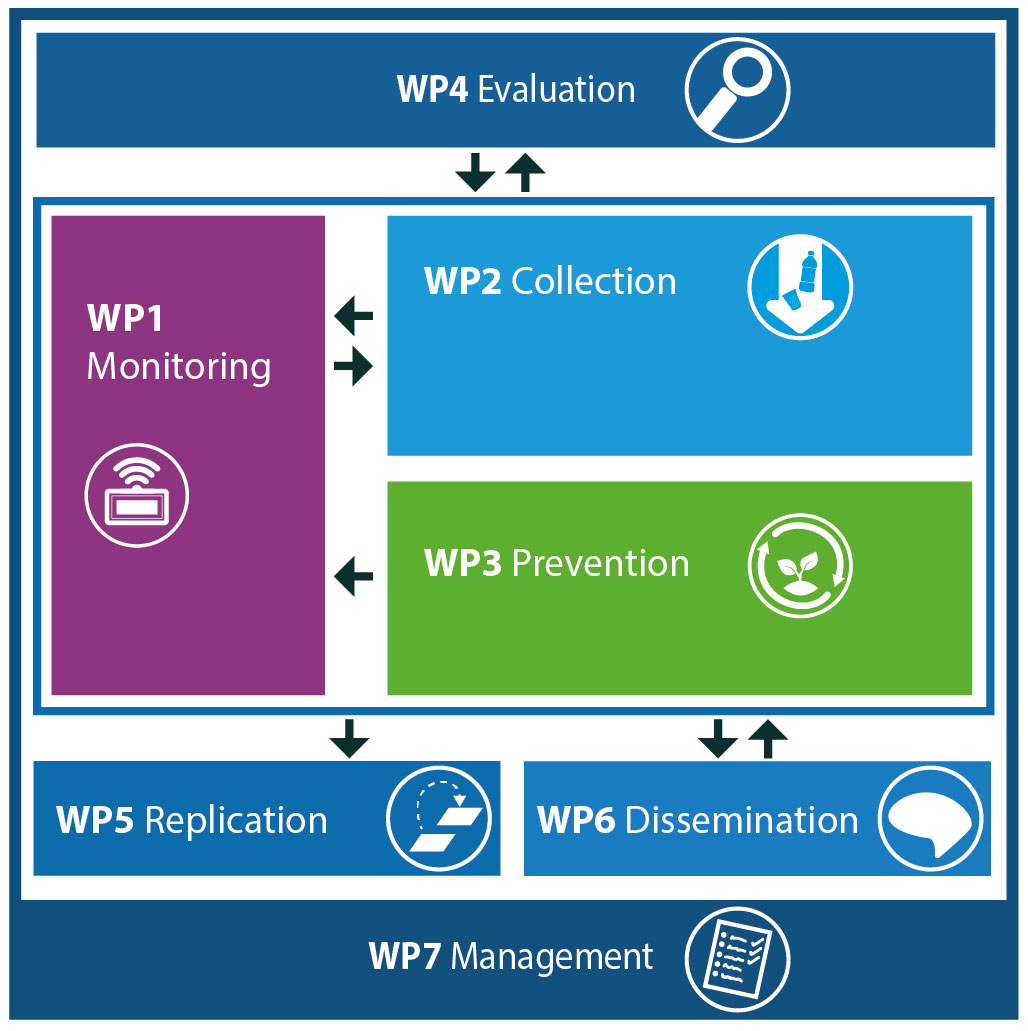
REMEDIES project consists of 3 technical (WP1 Monitoring plastic litter, WP2 Collection of plastic litter, WP3 Circular solutions for prevention of plastic waste) and 4 nontechnical (WP4 Sustainability assessment and optimisation of implemented measures, WP5 Scaling & Replication, WP6 Community engagement, dissemination & communication, WP7 Project Management) work packages.
Leader: National Institute of Chemistry
Objectives
- Upgrade the survey and monitoring of Marine Litter in European Sea protocols with a new technological monitoring toolbox to assess land and sea-based litter pollution in the 8 demo sites
- Map the plastic pollution in rivers, beach and seas using REMEDIES toolbox.
- Identify, track and recover loss of fishing gear, map plastic hotspot detection using drones with sensors
- Efficient clean-up strategy for identified plastic types with the developed clean-up app
Leader: Clera One
Objectives
- Marine litter collection from at least 85% of identified plastic pollution detected sites
- Select and set up technologies for minimisation of marine plastic litter on REMEDIES demo sites
- Long-term plastic pollution monitoring for 60% of all selected beaches, seas and rivers in demo sites
- Establishments of 5 plastic litter valorisation strategies involving fishing gear, microplastics, marine litter collected and collection of the (bio)plastics at the events
Leader: Alchemia-nova Greece
Objectives
- Develop approachable pathways for avoiding single-use plastic items in the first place
- Establish washing as a service with heat and water recovery for reusing cups and bottles
- Run citizen-science zero-waste cosmetic packaging workshops
- Deploy supply chains for zero waste solutions across all demos and replications
Leader: University of Maribor
Objectives
The overall WP4 objective is to ensure evaluation of impacts upstream and downstream. WP4 will establish the linkage between implemented measures and the impacted areas, where the measurable targets and associated indicators, such as eutrophication and acidification of marine environments, will be based on the definition of GES as established by WFD and MSFD, as well as the EU Zero Pollution Plan.
Specific objectives of WP4 are:
- Analyse the impact of upstream solutions by establishing impact pathways;
- Quantify the impact of implemented measures by assessing pollution both prior and after solutions impl.;
- Sustainability assessment using targets of WFD and MSFD to achieve GES and EU Zero Pollution Plan;
- Establish a digital platform to consolidate, access and communicate the impacts achieved.
Leader: F6S
Objectives
- Provide assistance to stakeholders potentially taking action towards plastic remediation and protection through innovation services, namely: technical, finance, business and governance
- Strengthen quintuple helix cooperation among stakeholders (academia, industry, society, governmen’t, environment’t)
- Setup and implement open call for associate regions procedures (formulation, publication, providing assistance, evaluation, contracting, monitoring of granted third parties)
- Replicate developed innovations through acceleration network
Leader: Impact Hub Athens
Objectives
- Raise awareness, inspire behavioural change & new actions, preventing distribution of non-degradable plastics
- Consistently and strategically communicate respective actions, outputs and outcomes to target audiences
- Empower an active community of citizens, stakeholders and actors who are taking action against pollution
- Engage multidisciplinary target audiences, through participatory practices, co-creative and citizens science formats for the promotion of a participatory socio-ecological governance
- Develop a framework for monitoring, evaluating the impact of community engagement activities, D&C
Leader: National Institute of Chemistry
Objectives
The main aim of WP7 is to ensure effective and efficient project coordination and management. The objectives are:
- At strategic level, to steer the project to ensure the project reaches its overall objectives addressing all unexpected situations, be these scientific, technological, environmental or societal;
- At operational level, to put in place the procedures and tools to ensure project progress in compliance with the Grant Agreement, Consortium Agreement and the project work plan producing timely and high-quality results;
- At administrative level, to organise project meetings, administer project payments, prepare project reports and ensure efficient collaboration and communication amongst partners.
Leader: National Institute of Chemistry
Discover the Code of Ethical Conduct of the REMEDIES program, here.



